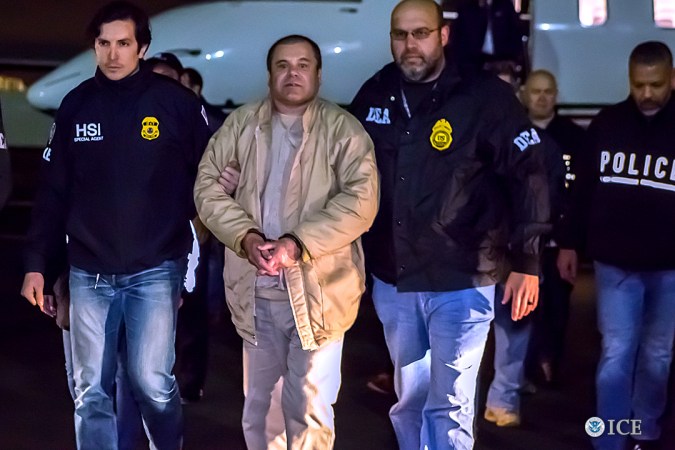Travel from one state to another in Mexico and you’ll find that Joaquín Guzmán – aka El Chapo – is either a Robin Hood helping the poor or a cold-blooded criminal responsible for the deaths of thousands. The country’s most infamous drug trafficker has been the source of a number of TV series, documentaries, and now, as he stands trial in Brooklyn, he’s the subject of VICE News’ first podcast: “Chapo: Kingpin on Trial.”
Released November 1, the podcast is a bilingual effort between VICE news reporter Keegan Hamilton and Miguel Ángel Vega, with episodes in both English and Spanish on Spotify.
For VICE News editor-in-chief Ryan McCarthy, it was clear that if the podcast was going to take an accurate look at El Chapo, it needed to be bilingual. Without hearing perspectives from people in Mexico, including Chapo’s own family members, they couldn’t get a full perspective on someone as divisive as the drug lord.
“The stakes were really high,” McCarthy says. “The charges against El Chapo were essentially the last 30 years of the drug war. There’s so much fear and hatred directed at him, and we were really eager to tell a different kind of story. Not one that defends Chapo, but one that explores how the relationship between the US and Mexico is much more complicated than this one person.”
When Hamilton began covering El Chapo years ago, he quickly discovered that in many cases, it was hard to differentiate between the man and the myth.

“El Chapo has become so surrounded in legend that in some cases it’s really difficult to separate fact from fiction,” Hamilton says. “He’s a complicated figure and what we’re trying to do is debunk the myth and find out what’s true and what’s not.”
The Sinaloa Cartel leader was named the most powerful drug trafficker in the world by the US Treasury Department and conservative estimates say he’s responsible for more than 2,000 deaths. But in his native La Tuna, many see him as a hometown hero.
“On one hand, it seems there’s no doubt he’s done many evil things,” Hamilton adds. “On the other hand, we spoke to people in Sinaloa who are adamant that he’s helped people there, and he’s only supplying drugs that Americans will consume anyway.”
Having grown up in Sinaloa, Vega is well-connected enough to work as a fixer, helping foreign journalists like Hamilton get in touch with local sources. Typically, it would be difficult to get family members and cartel members to go on the record, but because the journalists were working on a podcast, they were able to get an interview with a heroin trafficker in episode one and later spoke with Chapo’s sister.
“It seems to me like the drug lord is created to have someone to chase, someone to blame.”
Even still, in a town where taxi drivers, waitresses, or even a street clown could be an informant for Chapo, Vega says it’s important to take precautions. Just last year, his colleague and fellow narco-journalist Javier Valdez was murdered just blocks away from the Ríodoce newspaper offices.
“As a journalist, there’s always this fine line between safety and danger,” Vega tells me. “You never know when you’re going to say something that’s going to piss people off. Even when you think you’ll be okay, you have to plan in case something goes wrong. It’s the reality.”
At the end of the day, Hamilton says that beyond painting a picture of Chapo, what was most important to him was to leave people with a better understanding of the drug trade’s scope. As more information about Chapo’s exploits emerge during his trial, he said the real story between the US and Mexico is much bigger than just one kingpin.
“It’s indisputable that Chapo’s had a big impact in supplying a substantial percentage of the drugs that come into this country,” Hamilton says. “But even with him in jail in Manhattan with no ability to communicate to the cartel, the drugs are still coming at the same volume they were before.”
From Vega’s point of view, the entire drug war has been one long, inescapable saga, especially for the people of Mexico. After Chapo’s 2016 arrest, Vega still continues to see how narcotics have continued to lead to addiction and violence.
“The drug war seems unstoppable sometimes,” Vega says. “It seems to me like the drug lord is created to have someone to chase, someone to blame. But in the end, the problem continues. Sometimes it’s different characters, different names, but it’s the same problem and the same consumer: the US.”




